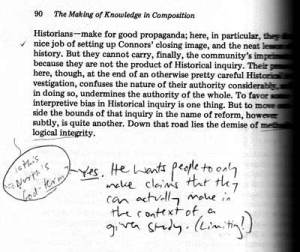(Though part of me wants to hyphenate e-book, I’m going to take a step of faith and ditch the hyphen. Ebook it is.)
This is just a quick note on my dream for perfect kind of ebook to please everyone, even folks who say how much they love the feel and smell of paper books. (Disclaimer: I’m an in-betweener. I’ve had a Kindle for two months and I love it to pieces, but I also love the physicality of books. I choose both/and.)
I’m reading a book now, and I’ve read books before, that just scream for multimedia add-ons. Either they post plenty of classical scores as examples, or they mention tons of pop pieces that seriously matter to the point of the book. In either case, I want to hear the things, but I often don’t go to the trouble, because I don’t want to log into my school’s library’s webpage, find the classical music database, and navigate to the piece I want to hear, just to hear a 30-second snippet that could legally, under fair use, be excerpted for me without all the work. Yes, there’s YouTube, but even that takes steps that I don’t always want to take–and that assumes I’m near a computer. (Wow, this sounds lazy, right?)
Alex Ross beautifully tries to fill this gap by providing a listening guide to The Rest is Noise (and also to his newer book that I haven’t read), which is full and rich in many ways: tons of excerpts, and an easy-to-buy iTunes playlist of the essentials already picked out. But again, I’ve got to be at the computer to hear it.
Yes, I’m complaining now, but this post is called Ebook dreaming for a reason. My dream:
- Paper books have invisible chips sewn into their covers or stuck to the inside flap as a sticker.
- These chips communicate seamlessly and wirelessly with portable music devices, including various brands of mp3 players and various kinds of phones. (Government regulation may be necessary to ensure standards.)
- When I read a place in a book where I want to hear the music described, I simply put on my headphones, touch my music device to the book, and scroll to track X (whatever the book tells me to scroll to), and listen. Ah, the comfort of musical knowledge.
- Digital versions of the books also include the same clips, playable through the headphone jack of the ereader or on the computer (or whatever device the book is being read on)
So, well–get on it. Thanks!




